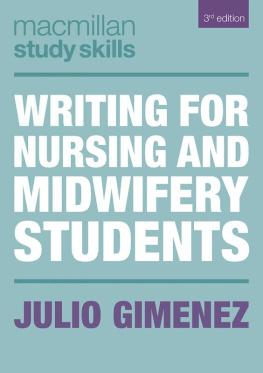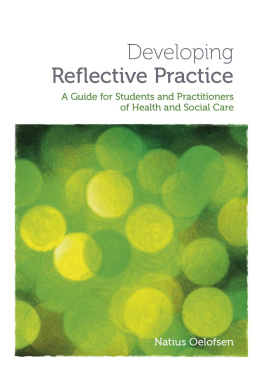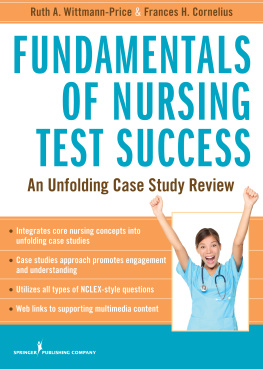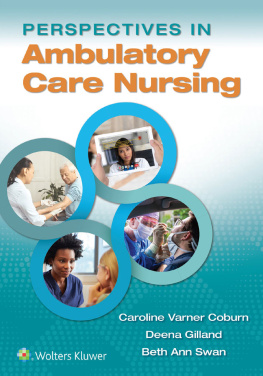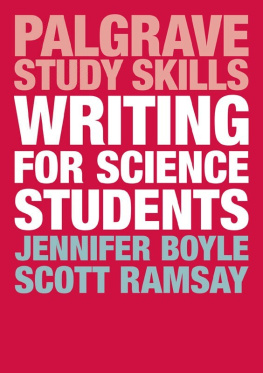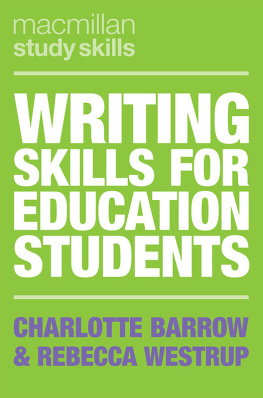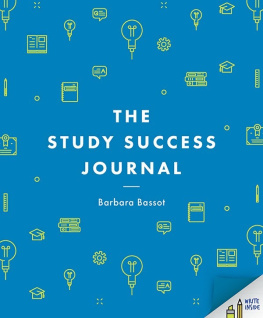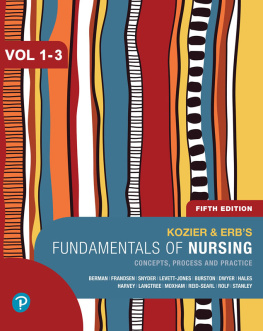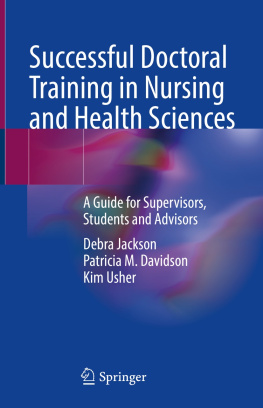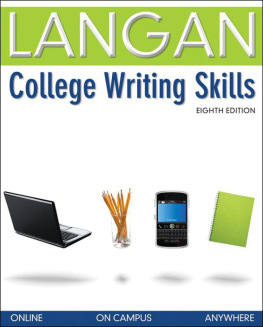Writing for Nursing and Midwifery Students
www.thestudyspace.com the leading study skills website
Study Skills
Academic Success
Academic Writing Skills for International Students
The Business Students Phrase Book
Cite Them Right (10th edn)
Critical Thinking and Persuasive Writing for Postgraduates
The Employability Journal
Essentials of Essay Writing
Get Sorted
Great Ways to Learn Anatomy and Physiology (2nd edn)
How to Begin Studying English Literature (4th edn)
How to Use Your Reading in Your Essays (3rd edn)
How to Write Better Essays (4th edn)
How to Write Your Undergraduate Dissertation (2nd edn)
Improve Your Grammar (2nd edn)
The Mature Students Handbook
Mindfulness for Students
The Palgrave Student Planner
The Personal Tutors Handbook
Presentation Skills for Students (3rd edn)
The Principles of Writing in Psychology
Professional Writing (3rd edn)
Smart Thinking
Stand Out from the Crowd
The Student Phrase Book
The Students Guide to Writing (3rd edn)
Studying in English
Studying History (4th edn)
Studying Law (4th edn)
Studying Physics
Study Skills for International Postgraduates
Success in Academic Writing (2nd edn)
The Undergraduate Research Handbook (2nd edn)
The Work-Based Learning Student Handbook (2nd edn)
Writing for Engineers (4th edn)
Writing History Essays (2nd edn)
Writing for Law
Writing for Nursing and Midwifery Students (3rd edn)
Writing for Science Students
Write it Right (2nd edn)
Pocket Study Skills
14 Days to Exam Success (2nd edn)
Analyzing a Case Study
Blogs, Wikis, Podcasts and More
Brilliant Writing Tips for Students
Completing Your PhD
Doing Research (2nd edn)
Getting Critical (2nd edn)
Managing Stress
Planning Your Dissertation (2nd edn)
Planning Your Essay (2nd edn)
Planning Your PhD
Posters and Presentations
Reading and Making Notes (2nd edn)
Referencing and Understanding Plagiarism (2nd edn)
Reflective Writing
Report Writing (2nd edn)
Science Study Skills
Studying with Dyslexia (2nd edn)
Success in Groupwork
Time Management
Wheres Your Argument?
Writing for University (2nd edn)
Research Skills
Authoring a PhD
The Foundations of Research (2nd edn)
Getting to Grips with Doctoral Research
Getting Published
The Good Supervisor (2nd edn)
The Lean PhD
PhD by Published Work
The PhD Viva
The PhD Writing Handbook
Planning Your Postgraduate Research
The Postgraduate Research Handbook (2nd edn)
The Professional Doctorate
Structuring Your Research Thesis
Career Skills
Excel at Graduate Interviews
The Graduate Career Guidebook
Graduate CVs and Covering Letters
Graduate Entrepreneurship
How to Succeed at Assessment Centres
Social Media for Your Student and Graduate Job Search
Work Experience, Placements and Internships
For a complete listing of all our titles in this area please visit www.macmillanihe.com/study-skills
Writing for Nursing and Midwifery Students
3rd edition
Julio Gimenez

Julio Gimenez, under exclusive licence to Springer Nature Limited 2007, 2011, 2019
All rights reserved. No reproduction, copy or transmission of this publication may be made without written permission.
No portion of this publication may be reproduced, copied or transmitted save with written permission or in accordance with the provisions of the Copyright, Designs and Patents Act 1988, or under the terms of any licence permitting limited copying issued by the Copyright Licensing Agency, Saffron House, 610 Kirby Street, London EC1N 8TS.
Any person who does any unauthorized act in relation to this publication may be liable to criminal prosecution and civil claims for damages.
The author has asserted his right to be identified as the author of this work in accordance with the Copyright, Designs and Patents Act 1988.
First edition 2007
Second edition 2011
This edition published 2019 by
RED GLOBE PRESS
Previous editions published by Palgrave
Red Globe Press in the UK is an imprint of Springer Nature Limited, registered in England, company number 785998, of 4 Crinan Street, London, N1 9XW.
Red Globe Press is a registered trademark in the United States, the United Kingdom, Europe and other countries.
ISBN 9781137531186 paperback
This book is printed on paper suitable for recycling and made from fully managed and sustained forest sources. Logging, pulping and manufacturing processes are expected to conform to the environmental regulations of the country of origin.
A catalogue record for this book is available from the British Library.
A catalog record for this book is available from the Library of Congress.
Contents
List of Tables
List of Figures
Acknowledgements
My first debt of gratitude is to those who wrote about writing before me and have therefore influenced my views and approach to teaching how to write in specific genres: John Swales, Charles Bazerman, Carolyn R. Miller, Chris Candlin, V. K. Bhatia and Ken Hyland, among many others.
I am also indebted to Suzannah Burywood, my commissioning editor, for her support and encouragement. I would also like to thank the four reviewers of the book whose comments have made this a better project. I did not always follow their advice, however, so the remaining flaws are my entire responsibility.
I am thankful to my colleagues at Middlesex University who provided me with enlightening comments during the writing process. Special thanks go to Victoria Odeniyi and Gillian Lazar at ELLS. I am similarly grateful to Clare Maher and Jane Raymond for their invaluable comments and support with the discipline-specific contents of the book, and to Dilys Hall for introducing me to RefWorks. I am equally thankful to my colleague and friend Beverly Fairfax for her comments and feedback on the first draft of the book.
This new edition has benefited immensely from the comments made by a large number of nursing, midwifery and writing lecturers who have adopted the book, and the many students who have also provided me with invaluable feedback. To all of them, I remain indebted.
I am thankful to EndNote and RefWorks for permission to reproduce the screenshots on pages 176179, and Refbase for permission to reproduce a screenshot of their main page on page 180.
To my students past and present who have given me the best a teacher can get, challenging comments and questions, thank you. Most of the ideas and materials in this book started as answers to such comments and questions.
These acknowledgements would be incomplete without thanking my family and colleagues who have once more believed in my projects; all my gratitude for their love and patience.
Julio Gimenez
University of Westminster, London, UK
Introduction
One of the most difficult tasks we are faced with when we enter university is writing. Not only are we asked to deal with new content, we are also required to engage in new intellectual processes and, in many cases, we must even learn to organize and structure knowledge in new ways. Writing, and especially writing assignments, becomes even more taxing for adult students who have been away from formal education for quite some time and come back to university via top-up courses or back-to-practice programmes.
Next page
